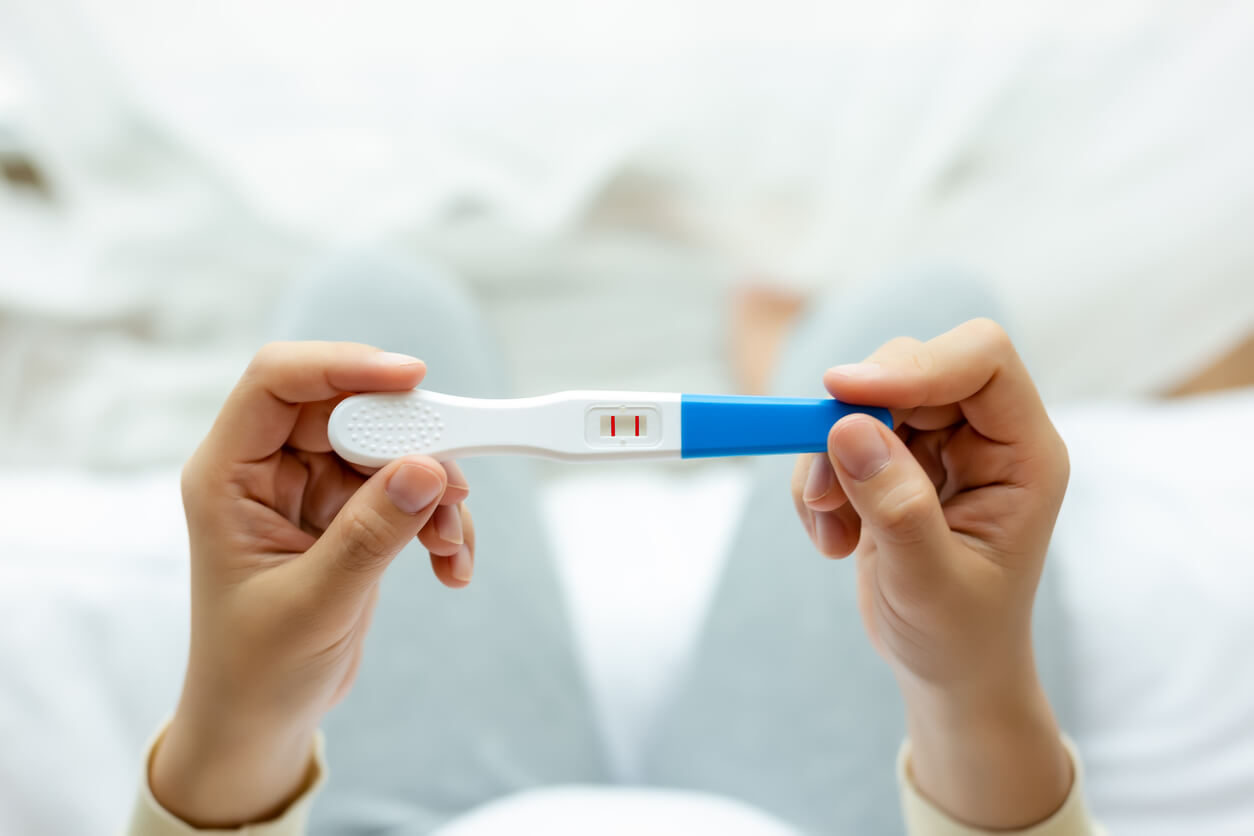My Period Is Delayed: Am I Pregnant?

When our period is delayed, we tend to associate it with pregnancy, however, this isn’t always the case. There are different factors related to lifestyle, hormonal functioning, and general health that can modify the female cycle.
Many of the causes of menstrual irregularities are preventable and therefore, today we’re going to tell you about them in detail. Are you interested?
What do we mean by menstrual delay?
The menstrual cycle is a periodic hormonal process, whose objective is to prepare the woman’s body to conceive and gestate a life.
This cycle is expected to occur with a certain regularity, that is, it maintains the frequency and duration of all its stages. In women, we say that the normal cycle lasts between 25 and 36 days in total, so it usually averages 28 days. However, you should know that this is an approximation, as only 10 to 15% of women reach this exact value.
However, sometimes a delay in the cycle can occur and the period is delayed. In other words, it doesn’t arrive on the day we estimate. It may even take days or months until the next onset. This change in rhythm is known as amenorrhea, which means ‘absence of menstruation’.
There are several causes of amenorrhea and the normality of these will depend on the context:
- Primary amenorrheas are those that occur between the first menstrual period and the following two to three years. This is explained by the immaturity of the hormonal axis that regulates the cycle and is considered physiological.
- Secondary amenorrheais is that which occurs after this adaptive period and may be physiological (such as pregnancy and lactation) or pathological (such as polycystic ovarian syndrome).

My period is delayed: Possible causes
As discussed above, there are many factors that can influence the menstrual cycle. When women have regular periods and have had unprotected sex, the first suspicion is pregnancy. However, sometimes it’s important to rule out other causes, such as those listed below.
The taking of medication
Medication can cause changes in the body and in some hormonal processes, even if this isn’t the desired effect. Some drugs cause secondary amenorrhea as an adverse effect, although this consequence may depend on the dose or frequency of consumption. Among the most prominent are the following:
- Chemotherapy drugs
- Antidepressants
- Antipsychotics
- Antihypertensives
Obesity
Obesity increases the risk of developing chronic diseases and also hormonal disorders resulting from increased adipose tissue. One of them is insulin resistance, which produces an increase in the levels of circulating androgens in a woman’s blood. These hormones inhibit ovulation and cause a delay in menstruation.
Weight loss and anorexia
Contrary to what happens with obesity, abrupt and excessive weight loss also produces menstrual irregularities. Especially if this happens in the context of diseases or strict diets that condition energy and nutrient intake.
When a significant reduction in body fat is experienced (as occurs in female athletes ), the body goes into a kind of “energy saving mode”. As a result, various hormonal changes occur and the menstrual cycle is disrupted.
Stress
Chronic stress is a condition that affects all structures of the body. When women live under very stressful situations that are sustained over time, this can trigger menstrual irregularities. It may also trigger more abundant bleeding and more marked premenstrual symptoms.
Polycystic ovaries
If we’re talking about menstrual delays, we can’t fail to mention one of its main causes: Polycystic ovary syndrome. This condition is caused by an overproduction of male hormones (androgens) in the ovaries themselves. As we mentioned in obesity, these endocrinological modifications generate an inhibition of ovulation and a change in menstruation.
Premenopause
During the period preceding menopause (which usually begins after the age of 45), it’s normal to notice some delays in the arrival of menstruation. This phenomenon could be related to the decrease in the levels of estrogen circulating in women.
Contraception
When women stop taking birth control pills or hormonal injections, after a long period of use, they may experience a delay in menstruation. Although of variable duration, amenorrhea can last more than 6 months.
Breastfeeding
While breastfeeding, a woman produces a hormone called prolactin. This alters the normal production of hormones that regulate the menstrual cycle, in order to inhibit ovulation and prevent a new pregnancy.
The frequency of occurrence of this type of amenorrhea and its frequency is variable from one woman to another, however, it usually occurs in the period of exclusive and on-demand breastfeeding.
Alterations in women’s health
Anatomical or functional problems of the pituitary or thyroid glands, cancer, ovarian insufficiency, endometriosis, or myomas, can generate imbalances in menstrual cycles.

My period is delayed: Am I pregnant?
One of the symptoms of pregnancy is the absence of menstruation. Therefore, if you’ve had unprotected sexual encounters during the menstrual cycle and there’s a delay in menstruation, it’s important to rule out pregnancy.
Menstrual bleeding occurs when there’s no conception, when the body expels the unfertilized egg, along with the lining of the inner walls of the uterus. If this bleeding doesn’t occur, pregnancy is a possibility and a pregnancy test is advisable.
Is it possible to prevent a delay in menstruation?
This only depends on the cause that causes the delay. If there are modifiable factors, such as stress, then changing your lifestyle can help restore menstrual regularity.
Here are some recommendations to maintain good reproductive health:
- Regular exercise: Walking, swimming, yoga, pilates, or aerobic exercises maintain the health of the body, increase self-esteem, and provide relaxation. This keeps you at the ideal weight, which is necessary for good reproductive functioning.
- Maintain a healthy diet: A balanced diet that’s rich in essential nutrients is necessary to avoid excessive weight loss and other negative alterations, such as anemia.
- Annual visits to the gynecologist: To prevent gynecological complications, it’s best to have annual medical check-ups.
- Reduce stress: Avoid situations that promote stress and anxiety.
- Take only the contraceptives prescribed by the specialist and in the prescribed manner.
It may be that the delay in your period is a matter of days and then everything goes back to normal. However, if it lasts more than 3 months and pregnancy tests are negative, you should make an appointment with your doctor.
When our period is delayed, we tend to associate it with pregnancy, however, this isn’t always the case. There are different factors related to lifestyle, hormonal functioning, and general health that can modify the female cycle.
Many of the causes of menstrual irregularities are preventable and therefore, today we’re going to tell you about them in detail. Are you interested?
What do we mean by menstrual delay?
The menstrual cycle is a periodic hormonal process, whose objective is to prepare the woman’s body to conceive and gestate a life.
This cycle is expected to occur with a certain regularity, that is, it maintains the frequency and duration of all its stages. In women, we say that the normal cycle lasts between 25 and 36 days in total, so it usually averages 28 days. However, you should know that this is an approximation, as only 10 to 15% of women reach this exact value.
However, sometimes a delay in the cycle can occur and the period is delayed. In other words, it doesn’t arrive on the day we estimate. It may even take days or months until the next onset. This change in rhythm is known as amenorrhea, which means ‘absence of menstruation’.
There are several causes of amenorrhea and the normality of these will depend on the context:
- Primary amenorrheas are those that occur between the first menstrual period and the following two to three years. This is explained by the immaturity of the hormonal axis that regulates the cycle and is considered physiological.
- Secondary amenorrheais is that which occurs after this adaptive period and may be physiological (such as pregnancy and lactation) or pathological (such as polycystic ovarian syndrome).

My period is delayed: Possible causes
As discussed above, there are many factors that can influence the menstrual cycle. When women have regular periods and have had unprotected sex, the first suspicion is pregnancy. However, sometimes it’s important to rule out other causes, such as those listed below.
The taking of medication
Medication can cause changes in the body and in some hormonal processes, even if this isn’t the desired effect. Some drugs cause secondary amenorrhea as an adverse effect, although this consequence may depend on the dose or frequency of consumption. Among the most prominent are the following:
- Chemotherapy drugs
- Antidepressants
- Antipsychotics
- Antihypertensives
Obesity
Obesity increases the risk of developing chronic diseases and also hormonal disorders resulting from increased adipose tissue. One of them is insulin resistance, which produces an increase in the levels of circulating androgens in a woman’s blood. These hormones inhibit ovulation and cause a delay in menstruation.
Weight loss and anorexia
Contrary to what happens with obesity, abrupt and excessive weight loss also produces menstrual irregularities. Especially if this happens in the context of diseases or strict diets that condition energy and nutrient intake.
When a significant reduction in body fat is experienced (as occurs in female athletes ), the body goes into a kind of “energy saving mode”. As a result, various hormonal changes occur and the menstrual cycle is disrupted.
Stress
Chronic stress is a condition that affects all structures of the body. When women live under very stressful situations that are sustained over time, this can trigger menstrual irregularities. It may also trigger more abundant bleeding and more marked premenstrual symptoms.
Polycystic ovaries
If we’re talking about menstrual delays, we can’t fail to mention one of its main causes: Polycystic ovary syndrome. This condition is caused by an overproduction of male hormones (androgens) in the ovaries themselves. As we mentioned in obesity, these endocrinological modifications generate an inhibition of ovulation and a change in menstruation.
Premenopause
During the period preceding menopause (which usually begins after the age of 45), it’s normal to notice some delays in the arrival of menstruation. This phenomenon could be related to the decrease in the levels of estrogen circulating in women.
Contraception
When women stop taking birth control pills or hormonal injections, after a long period of use, they may experience a delay in menstruation. Although of variable duration, amenorrhea can last more than 6 months.
Breastfeeding
While breastfeeding, a woman produces a hormone called prolactin. This alters the normal production of hormones that regulate the menstrual cycle, in order to inhibit ovulation and prevent a new pregnancy.
The frequency of occurrence of this type of amenorrhea and its frequency is variable from one woman to another, however, it usually occurs in the period of exclusive and on-demand breastfeeding.
Alterations in women’s health
Anatomical or functional problems of the pituitary or thyroid glands, cancer, ovarian insufficiency, endometriosis, or myomas, can generate imbalances in menstrual cycles.

My period is delayed: Am I pregnant?
One of the symptoms of pregnancy is the absence of menstruation. Therefore, if you’ve had unprotected sexual encounters during the menstrual cycle and there’s a delay in menstruation, it’s important to rule out pregnancy.
Menstrual bleeding occurs when there’s no conception, when the body expels the unfertilized egg, along with the lining of the inner walls of the uterus. If this bleeding doesn’t occur, pregnancy is a possibility and a pregnancy test is advisable.
Is it possible to prevent a delay in menstruation?
This only depends on the cause that causes the delay. If there are modifiable factors, such as stress, then changing your lifestyle can help restore menstrual regularity.
Here are some recommendations to maintain good reproductive health:
- Regular exercise: Walking, swimming, yoga, pilates, or aerobic exercises maintain the health of the body, increase self-esteem, and provide relaxation. This keeps you at the ideal weight, which is necessary for good reproductive functioning.
- Maintain a healthy diet: A balanced diet that’s rich in essential nutrients is necessary to avoid excessive weight loss and other negative alterations, such as anemia.
- Annual visits to the gynecologist: To prevent gynecological complications, it’s best to have annual medical check-ups.
- Reduce stress: Avoid situations that promote stress and anxiety.
- Take only the contraceptives prescribed by the specialist and in the prescribed manner.
It may be that the delay in your period is a matter of days and then everything goes back to normal. However, if it lasts more than 3 months and pregnancy tests are negative, you should make an appointment with your doctor.
All cited sources were thoroughly reviewed by our team to ensure their quality, reliability, currency, and validity. The bibliography of this article was considered reliable and of academic or scientific accuracy.
- Konovalova, E. (2013). El ciclo menstrual y el entrenamiento deportivo: una mirada al problema. ev. U.D.C.A Act. & Div. Cient. 16(2): 293-302, Julio-Diciembre, 2013. Recuperado de: https://revistas.udca.edu.co/index.php/ruadc/article/view/900/1074.
- Mayo clinic (2021). Amenorrea. Recuperado de: https://www.mayoclinic.org/es-es/diseases-conditions/amenorrhea/symptoms-causes/syc-20369299
- National Institutes of Health NIH (2022) Amenorrea. Recuperado de: https://espanol.nichd.nih.gov/salud/temas/amenorrhea
- Ramírez, A. et al. (2022). Obesidad en el ciclo vital femenino y su asociación con trastornos menstruales. Medicina interna. Org. México. Vol. 38. N° 2 Pp: 344-354. Recuperado de: https://www.medigraphic.com/pdfs/medintmex/mim-2022/mim222l.pdf
- Sociedad Española de Ginecología y Obstetricia (2013). Protocolo SEGO. Amenorrea primaria y secundaria. Sangrado infrecuente (actualizado febrero 2013). Vol 56. Núm 9. Recuperado de: https://www.elsevier.es/es-revista-progresos-obstetricia-ginecologia-151-articulo-protoloco-sego-amenorrea-primaria-secundaria–S0304501313000988
This text is provided for informational purposes only and does not replace consultation with a professional. If in doubt, consult your specialist.








